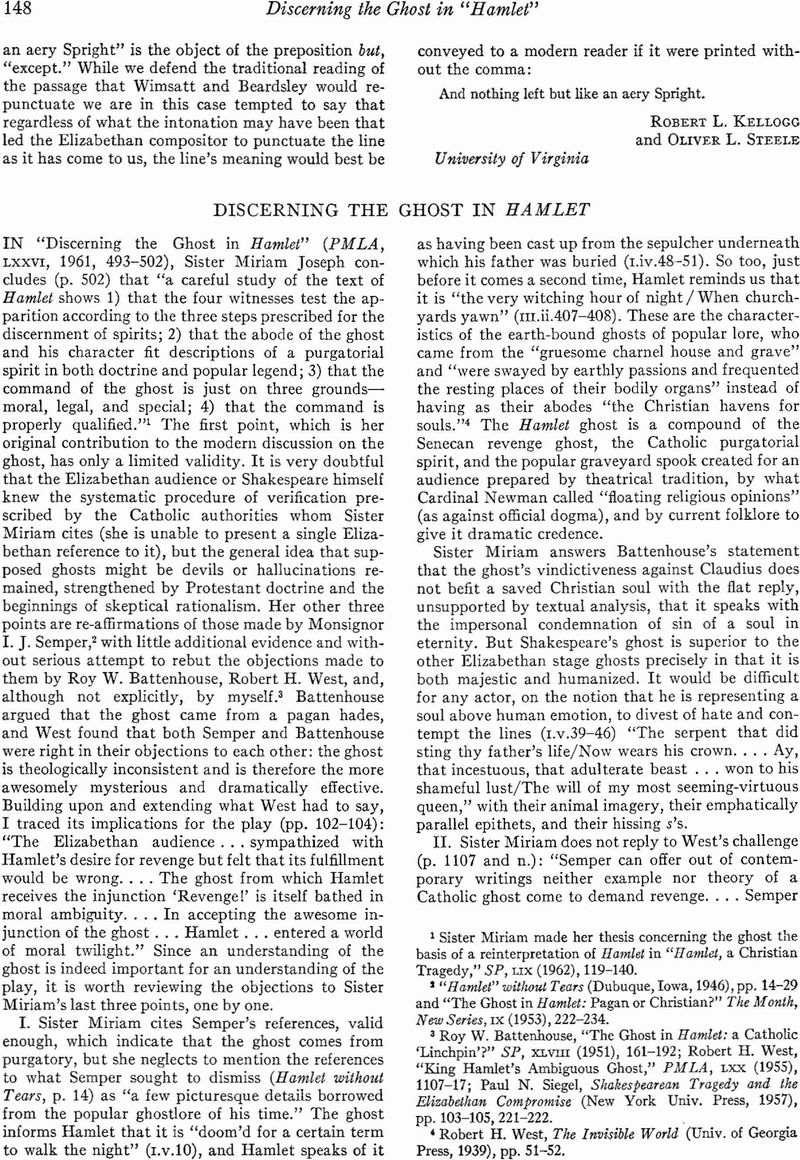Published online by Cambridge University Press: 02 December 2020

Note 1 in page 148 Sister Miriam made her thesis concerning the ghost the basis of a reinterpretation of Hamlet in “Hamlet, a Christian Tragedy,” SP, LIX (1962), 119–140.
Note 2 in page 148 “Hamlet” without Tears (Dubuque, Iowa, 1946), pp. 14–29 and “The Ghost in Hamlet: Pagan or Christian?” The Month, New Series, ix (1953), 222–234.
Note 3 in page 148 Roy W. Battenhouse, “The Ghost in Hamlet: a Catholic ‘Linchpin‘?” SP, XLVHI (1951), 161–192; Robert H. West, “King Hamlet's Ambiguous Ghost,” PMLA, LXX (1955), 1107–17; Paul N. Siegel, Shakespearean Tragedy and the Elizabethan Compromise (New York Univ. Press, 1957), pp. 103–105, 221–222.
Note 4 in page 148 Robert H. West, The Invisible World (Univ. of Georgia Press, 1939), pp. 51–52.
Note 5 in page 149 See among others Alfred Hart, Shakespeare and the Homilies (Melbourne Univ., 1934), pp. 9–76, and E. M. W. Tillyard, Shakespeare's History Plays (New York, 1946), pp. 64–70.
Note 6 in page 149 Irving Ribner, The English History Play in the Age of Shakespeare (Princeton Univ. Press, 1957), pp. 309–318.
Note 7 in page 149 Sister Miriam cites a passage in The Mirror for Magistrates to prove (p. 500) that Claudius' being a murderer makes the throne “morally vacant.” As Lily B. Campbell points out in her introduction, however (The Mirror for Magistrates, ed. Lily B. Campbell, New York, 1960, pp. 52–53), the doctrine voiced again and again in the work is the orthodox Tudor doctrine of obedience to the de facto king, be he good or evil. The passage cited by Sister Miriam, written shortly before Mary's death, when Elizabeth was the hope of the Marian refugees and had militant popular support against other aspirants who it was feared would be imposed on the nation, deviates somewhat from the orthodox doctrine by stating, with specific reference to current politics, that the throne must not have been “iniuriously procured by rigour of sword and open force” for the prince to be God's deputy. The passage, which significantly emphasizes the right of women to rule, is atypical, the orthodox doctrine having been stated a few pages before (p. 412) in the very poem on which it is a commentary: “A christen subiect should with honour due, / Obey his soveraygne though he were a lue.” It is, moreover, inapplicable to Claudius, for he gained his throne by election with national consent, not by “rigour of sword and open force.”
Note 8 in page 149 So G. L. Kittredge regards “Taint not thy mind” as referring to Gertrude, not to Claudius. Cf. his note in his edition to the play (New York, 1939), p. 170.